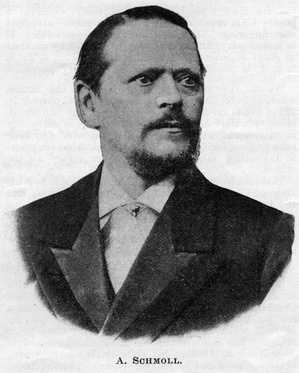 A. Schmoll was born August 17, 1841, in Fromberg, near Kreuznach, Germany. He began to study the piano at the age of seven under his brother-in-law, Martin Ehrhardt. His teacher was so much struck by the zeal and industry of his pupil that he advised his father to send him to the Cologne Conservatory to be educated for the profession. The elder Schmoll, however, had a prejudice against a musician’s career for his son, and refused to consider the suggestion. At the age of ten the boy took up the study of the organ with equal enthusiasm. Two years later he played a mazurka of his own composition in a concert, and was warmly received. His father still held firmly to his resolution not to allow him to become a musician; it was decided that he should fit himself for a mining engineer, and at the age of eighteen he entered a school of mines with this end in view. There he spent two years and then was obliged to serve the customary three years in the army. At the end of his term of service he resolved to take his fate in his own hands and devote himself to music, which he did in face of the most strenuous opposition from his family. To make his resolution irrevocable he left Germany, gave up his German citizenship, and took a modest position in the south of France, near Carcassonne. There he devoted his spare time to the study of harmony, counter-point, and composition. In 1867 he removed to Toulouse, where the merits of his compositions and his solid musical qualities won him many friends and pupils. In 1872 he went to Brussels, but left two years later to take up his residence in Paris, where he still remains.
A. Schmoll was born August 17, 1841, in Fromberg, near Kreuznach, Germany. He began to study the piano at the age of seven under his brother-in-law, Martin Ehrhardt. His teacher was so much struck by the zeal and industry of his pupil that he advised his father to send him to the Cologne Conservatory to be educated for the profession. The elder Schmoll, however, had a prejudice against a musician’s career for his son, and refused to consider the suggestion. At the age of ten the boy took up the study of the organ with equal enthusiasm. Two years later he played a mazurka of his own composition in a concert, and was warmly received. His father still held firmly to his resolution not to allow him to become a musician; it was decided that he should fit himself for a mining engineer, and at the age of eighteen he entered a school of mines with this end in view. There he spent two years and then was obliged to serve the customary three years in the army. At the end of his term of service he resolved to take his fate in his own hands and devote himself to music, which he did in face of the most strenuous opposition from his family. To make his resolution irrevocable he left Germany, gave up his German citizenship, and took a modest position in the south of France, near Carcassonne. There he devoted his spare time to the study of harmony, counter-point, and composition. In 1867 he removed to Toulouse, where the merits of his compositions and his solid musical qualities won him many friends and pupils. In 1872 he went to Brussels, but left two years later to take up his residence in Paris, where he still remains.
The first visit he made there was to Stephen Heller, of whose works he had always been an enthusiastic admirer. It was a bright winter day; he was therefore not a little astonished on being shown into the study to find the shutters closed and the composer working by candle-light. It was Heller’s whim to live like a hermit in the great city, the stir and bustle of which disturbed the free action of his fancy. He received the young German with the utmost cordiality; they became close friends, and remained such up to the time of Heller’s death at the age of seventy-three, January 14, 1888.
Herr Schmoll’s works are mostly for the piano. Among the most used are his primary method; 80 etudes, op. 116-119, moderately difficult; 10 sonatas, op. 61-70; 50 “Grandes Etudes,” op. 121-123; and “Album de Lectures,” op. 96-99. A selection of his studies has been issued recently in this country. He has composed some two hundred drawing-room pieces, which are used extensively in France. The scene of his activity is Paris, where he publishes his work himself. His most popular composition in America is his “Spinnino,” which has been reprinted by most American publishers.
His leisure hours he devotes to scientific and philosophical questions. An intense admiration for the works of Camille Flammarion led to an intimacy with the astronomer and a close study of astronomical phenomena. On Flammarion’s invitation he became one of the twelve founders of the Société Astronomique de France, which now numbers more than two thousand members. His statistics of sun-spots, which he brought before the society between 1887 and 1892, were favorably noticed in the reports of the Académie des Sciences. He is also interested in metaphysics, and contributes freely to the psychical magazines Sphinx (Munich) and Psychischen Studien (Leipzig), besides furnishing reports of numerous experiments in telepathy, or thought transference, to the Society for Psychical Research (London).
In short, he is an interesting example of the aspiring musician who, not content with reaching an eminent position in his profession, finds solace and recreation in intellectual pursuits of a high order. His career, like that of Schumann’s, is a warning to parents and guardians that it is useless to combat a child’s disposition for an art career, if that disposition be firm and deeply rooted.



